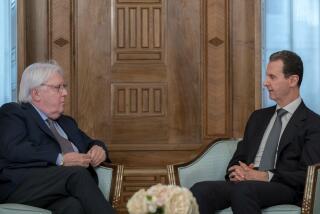Talks on Sidelines Called Positive : Islamic Summit, a Success in That It Was Held at All, Ends
- Share via
KUWAIT — Leaders of the Islamic world ended a conference here Thursday without achieving any breakthroughs on a long list of protracted disputes.
But the meeting, which began Monday, was regarded by many participants as a success in that it took place at all. There had been a number of threats against the Kuwaiti hosts by Iranian-supported underground groups.
Also seen as a positive step were the discussions among Arab leaders that took place on the conference’s sidelines.
The 21 heads of state and representatives of 23 other Muslim nations, convening under the banner of the Organization of the Islamic Conference, adopted a grab bag of resolutions that appeared to be aimed at pleasing everyone here.
Distinctions on Terrorism
For example, the conference adopted a Kuwaiti resolution condemning terrorism in all forms, but it drew a distinction between “unjustifiable” acts and “legitimate struggle,” such as the Palestinian fight against Israel.
At the same time, the conference adopted a resolution sponsored by Syria, a country that has been accused of supporting terrorism, that calls for convening an international conference on terrorism.
In some instances, the resolutions appeared to be contradictory. One welcomed Egyptian President Hosni Mubarak back to the conference for the first time since Egypt signed a peace treaty with Israel in 1979--but it condemned Egypt for signing the treaty.
There was one that condemned the United States for its April, 1986, attack on Libya and called on Washington to pay economic compensation to the Libyan regime.
‘Campaign’ Against Syria
Another condemned what it called an American, British and Israeli campaign against Syria but failed to mention Western allegations that Syria has sponsored terrorist activity, including what Britain has called a Syrian attempt to blow up an Israeli airliner in London last April.
On the Middle East question, the conference adopted resolutions calling on Israel to withdraw from occupied Arab lands and for the creation of an independent Palestinian state.
Its only deviation from past such resolutions was its endorsement of a so-called preparatory meeting for an international Mideast peace conference. The idea of a preparatory conference, as yet undefined in detail, was suggested by Egypt’s Mubarak and Israel’s then-Prime Minister Shimon Peres last fall at a meeting in Alexandria, Egypt.
The conference failed to come to grips with the region’s most nettlesome question of the moment--the Iran-Iraq War, which is in its seventh year and raging only an hour’s drive from the conference.
Boycotted by Iran
Iran, which is a member of the Islamic Conference, boycotted the meeting, arguing that Kuwait, as an ally of Iraq, is not neutral territory.
A final communique issued by the conference expressed concern over the escalation of the war and called for an end to the fighting. But an effort to send a peace mission to Iran failed to get enough support and was dropped.
By all accounts, the most significant developments here took place in the informal meetings on the conference’s margins. For example, President Hafez Assad of Syria met for nearly an hour Wednesday with Lebanon’s President Amin Gemayel, their first encounter since a Syrian-brokered Lebanese peace collapsed last January after opposition by Gemayel’s Christian supporters.
Gemayel, whose Christian enclave has been shelled and isolated by Syrian troops since the collapse of talks last year, was quoted as saying, “I want to thank all friendly and brotherly countries which have offered to help, especially Syria under President Assad.”
Assad, Mubarak Talk
Equally important was Assad’s brief chat with Egypt’s Mubarak. While the Syrians were quick to deny that there was any political significance to the meeting, it was clear that the rehabilitation of Egypt after years of isolation for making peace with Israel has been substantially advanced.
Also, Jordan’s King Hussein held his first talks in nearly a year with Yasser Arafat, chairman of the Palestine Liberation Organization.
More to Read
Sign up for Essential California
The most important California stories and recommendations in your inbox every morning.
You may occasionally receive promotional content from the Los Angeles Times.













